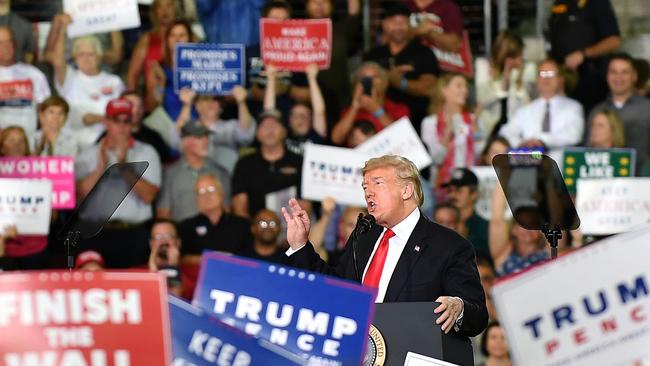Crazed liberal critics only give Donald Trump a boost

Whom the gods would destroy, they first make mad, we are told by the ancients. Donald Trump is no one’s idea of a god but his ability to reduce his opponents to wailing, gibbering husks, like demented characters in a Greek tragedy, seems increasingly Olympian in its reach.
Last weekend, as Brett Kavanaugh, the president’s Supreme Court nominee, was finally being confirmed in the Senate, the Furies were unleashed and the Republicans’ foes took flight from the asylum.
A very senior but hitherto invisible executive at Google, Dave Hogue, tweeted: “You are finished, @GOP. You polished the final nail for your own coffins. F***. YOU. ALL. TO. HELL.” He followed that with: “I hope the last images burned into your slimy, evil, treasonous retinas are millions of women laughing and clapping and celebrating as your souls descend into the flames.” I should remind you that Google’s founding motto, the leitmotif of the internet giant’s very existence, is: “Don’t be evil.”
Some sceptics have sneered at what they see as the hypocritical moralising of a company that, among other things, avoids paying taxes in jurisdictions where it makes profits, imposes illegal restrictions on mobile phone makers to cement the dominance of its own operating software and connived with the authorities in China to produce a censored search engine that would block phrases like “human rights”. But I think that’s unfair. Thanks to Mr Hogue’s animadversions on an entire political party, we now have a much more clearly defined sense of what passes for evil in Google’s moral universe. Don’t be evil = don’t be a Republican.
Then there was Christine Fair, an associate professor in the School of Foreign Service at Georgetown University, widely considered the nation’s top institution for the study of diplomacy - yes diplomacy - who delivered her own verdict on the Kavanaugh decision: “All of them (white, male Republicans) deserve miserable deaths while feminists laugh as they take their last gasps. Bonus: we castrate their corpses and donate them to swine? Yes.”
Georgetown is nominally a Roman Catholic institute of higher education, run by the Society of Jesus. There is no evidence that Professor Fair’s tweet was approved by any canonical authority, and Georgetown has long sought to distance itself from any association with the church in any case, so we must assume that her fervent prayer was merely freelance theology.
And here comes Ariel Dumas, a “writer” on the Stephen Colbert comedy show on CBS. “Whatever happens, I’m just glad we ruined Brett Kavanaugh’s life”, she tweeted. Mr Colbert has neither pledged to avoid evil, nor does he rank in anyone’s lists of institutions of learning. But he has often claimed a strong moral purpose to his work so we must assume it’s this that is animating his staff.
Souls consumed in unquenchable fire. Human testicles as swine-feed. The simple pleasure derived from seeing a life in ruins. These are a few of the American left’s favourite things. Appreciably more woke than raindrops on roses or whiskers on kittens. I pick on these three not because they were the most vile of the frenzied ululations of the last week, not by a long shot. And I should acknowledge that they were in a depressing sense in keeping with the tone of American political debate. I’ve no doubt that if the Kavanaugh decision had gone the other way equally crazed people on the right would have been calling down similar horrors on their opponents.
But what’s significant about these deranged howls is where they come from: influential voices from the tech sector that controls so much of our online activity; from an educational establishment that decides so much of what our children learn; and from the media sector that determines the bulk of the entertainment and information we consume. A kind of Devil’s triangle, if you will, that encloses the tight hold that the left has over so much of cultural and commercial lives.
The past few weeks have marked a turning point in US politics in a number of ways. It’s become commonplace to say that the formal and informal institutions of public life have been profoundly damaged. That’s not entirely clear. Certainly, Congress did itself no favours with the ugly spectacle of cynical political manipulation it presented. The Supreme Court’s reputation as the impartial arbiter of the law was already pretty badly dented after a generation or more of political decisions dropped in its lap. The media, who have done so much to inflame the angry passions on both sides, have surely inflicted on themselves a further heavy blow to their credibility, thanks to partisan reporting that was so thin it would not have held up against the gentlest breeze of fact-checking and impartial corroboration.
For Mr Trump, though, it’s been perhaps the most successful phase of his presidency. For the first time since he swaggered onto the political stage and crashed the Republican Party, he has succeeded in uniting it behind him. The lingering doubts among Republicans about his probity, competence, conservative credentials and the risks he poses to the norms of liberal democracy and public discourse have been eclipsed by what they see as the exigencies of the fight against an opponent whose anger and loathing rises by the day.
Republicans are galvanised in a way they haven’t been since Mr Trump came to office. The midterm elections are just a few weeks away and it still looks as though Democrats will make gains. If they do, the pressure on Mr Trump is sure to intensify. But after a September to remember he seems certain to have more Republicans willing to back him, come what may.
The Times


